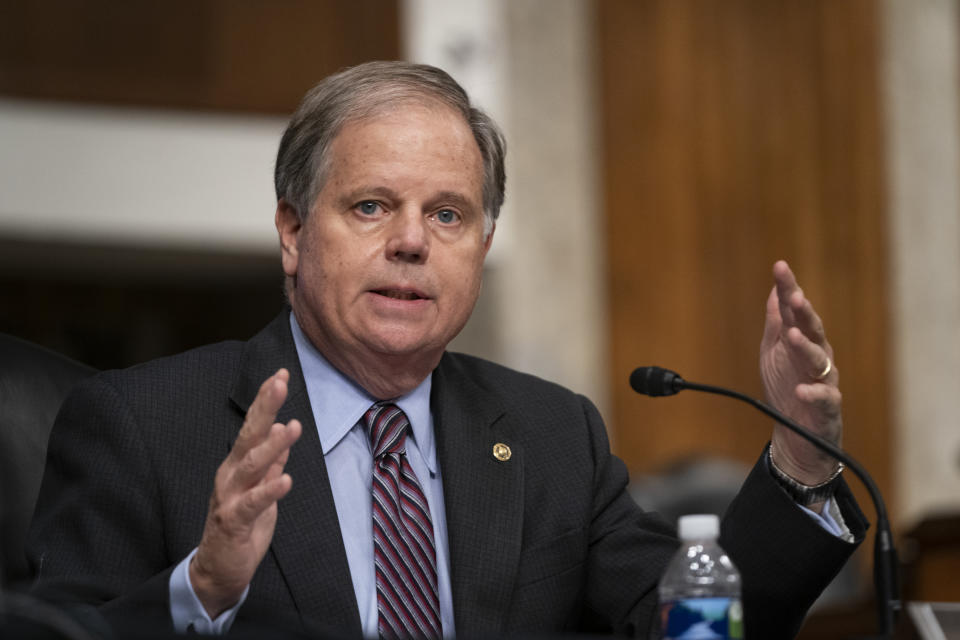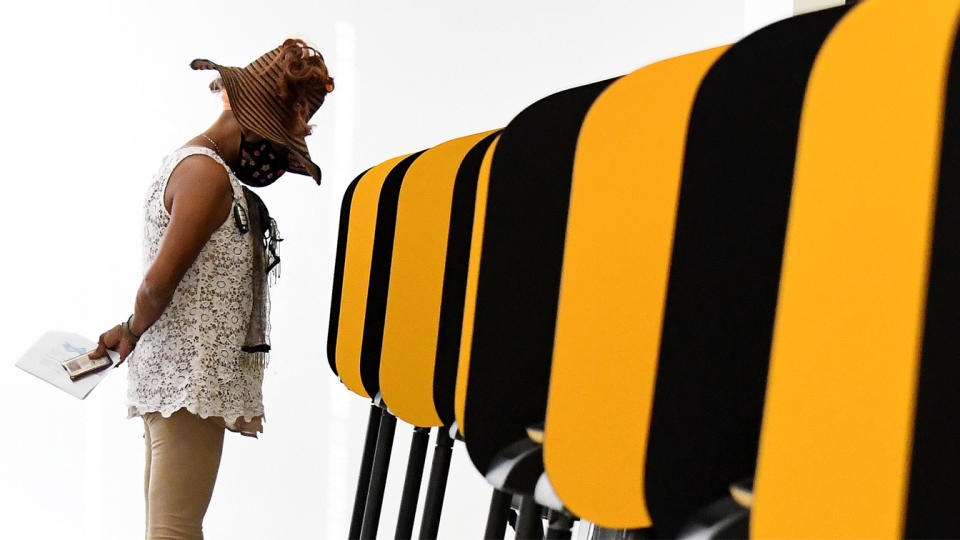While you weren't sleeping: Democrats disappoint in House and Senate races
While much of the attention Tuesday night was focused on the as-yet-to-be-decided presidential race, there were thousands of races settled, from state legislative seats and ballot initiatives to senators and governors facing reelection. Here are a few of the big takeaways from 2020’s down-ballot races.
Bad night for Democrats in legislative races

With the caveat that we won’t know the final results of a number of races for a while and that Democrats saw calls go their way well after Election Day 2018 as more votes were counted, Tuesday night was a disappointment for Democrats who went in thinking they would expand their 30-plus-seat margin in the House but may actually wind up with a slimmer majority.
As of Wednesday afternoon, Democrats had taken two seats they expected to flip in North Carolina but lost at least seven, per Associated Press calls: two in Florida, one in South Carolina, one in Oklahoma, one in Minnesota, one in New Mexico and at least one in Iowa. They had hoped to net 10 seats in Texas and may not win any of them, while a number of incumbents are locked in tighter-than-expected races.
“Polls (esp. at district-level) have rarely led us more astray & it’s going to take a long time to unpack,” wrote Dave Wasserman, an analyst for the nonpartisan Cook Political Report, of the evening’s surprises.
“It’s a dumpster fire,” one unnamed Democratic lawmaker told Politico, with a more blunt description of the situation.
Although Democratic control of the House did not appear to be threatened, the poor showing could presage a revolt against Speaker Nancy Pelosi and a leadership fight in the next Congress.
Democrats also appeared to be falling short in their efforts to retake the Senate. Republicans held on to hotly contested seats in Maine (Susan Collins), Iowa (Joni Ernst) and South Carolina (Lindsey Graham), and were leading in North Carolina and Georgia. A second Georgia seat that was the subject of a special election will go to a runoff in January. Democrats picked up seats in Arizona (Mark Kelly) and Colorado (John Hickenlooper) but lost in Alabama, where Republican Tommy Tuberville defeated Doug Jones.
Democratic hopes to win majorities in a number of state legislatures also fell short, leaving Republicans in control of the redistricting process that will follow the 2020 U.S. Census.
Legal access to marijuana expands

Voters across the country voted to legalize weed, with Arizona, Montana, New Jersey and South Dakota all approving ballot measures. In Mississippi, voters took a smaller step, legalizing the use of medical marijuana. In Arizona, the new measure also allows those with some past marijuana convictions to ask for their records to be expunged. Since Washington and Colorado first legalized the drug in 2012, a total of 11 states and the District of Columbia now allow the recreational use of marijuana.
Voters in Oregon took things a step further, passing Measure 110, which decriminalized the possession of small amounts of hard drugs, including heroin, cocaine and LSD. Instead of facing possible jail time, users would have the option of paying $100 fines or attending free addiction recovery centers funded by tax revenue from the state’s retail marijuana sales, following the model of some European countries such as Portugal. Oregon also voted to legalize psychedelics such as “magic mushrooms,” and voters in Washington, D.C., voted to decriminalize similar items.
Notable firsts

History was made in several races:
• 30-year-old Sarah McBride became the nation’s first openly transgender state senator after winning her race in Delaware.
• Progressive Democrat Cori Bush became the first Black woman ever elected to Congress by the state of Missouri, winning her House race.
• Democratic House candidates Mondaire Jones and Ritchie Torres both won in New York, becoming the first openly gay Black men elected to Congress. Torres is also the first openly gay Afro-Latino person elected.
• New Mexico became the first state to send a delegation made up entirely of women of color to the U.S. House, with Democratic Rep. Deb Haaland winning reelection, Republican Yvette Herrell flipping a Democratic seat and Democrat Teresa Leger Fernandez winning an open seat.
A drama-free night for gubernatorial races
Were you an incumbent governor up for reelection? Congratulations, you won! From Republican Phil Scott in Vermont to Democrat Jay Inslee in Washington state, incumbents retained their seats. The only incumbents with races expected to be relatively close were in North Carolina with Democrat Roy Cooper and in Missouri with Republican Mike Parsons, but both held onto their seats. The only state to see control of its governor’s mansion flip was in Montana, where Democrat Steve Bullock was term-limited out of office and Republican Rep. Greg Gianforte won the race to succeed him.
Other ballot initiatives of note

Besides the drug-related ballot measures, voters across the country made decisions on everything from the minimum wage to abortion rights. A few results:
• In Colorado, voters defeated a proposed ban on most abortions occurring after 22 weeks. Voters in Louisiana went in the opposite direction, amending the state’s constitution to add mostly symbolic language stipulating that it doesn’t protect a right to have an abortion or to have the state pay for one.
• Voters in Florida opted to raise the minimum wage in the state, pushing it to $10 an hour effective in September 2021 and raising it by a dollar each year to $15 in 2026.
• In California, “gig economy” companies Uber, Lyft and DoorDash designed Proposition 22 to lock in their drivers as independent contractors, exempting themselves from a state labor law that would have forced them to classify drivers as employees and to pay benefits including health care and unemployment insurance. The companies spent tens of millions of dollars promoting the measure, which if enacted could serve as the template to rewrite labor laws across the country. The referendum was expected to pass.
• Voters in Colorado also passed Proposition 18, which allows for 12 and, in some cases, 16 weeks of paid family and medical leave funded by a payroll tax, split between employees and employers.
• Voters in Mississippi chose their new state flag, replacing one that included Confederate iconography with one that displays a white magnolia flower and the words “In God We Trust.” Mississippi also voted to end a convoluted Jim Crow-era system of electing statewide officials.
• Both Massachusetts and Alaska rejected measures to implement ranked-choice voting, a system under which voters rank the candidates in their order of preference.
• Voters in Missouri appear to have narrowly eliminated a plan passed in 2018 that would have put an independent demographer in charge of drawing state legislative district maps and will instead revert to a system that effectively returns control to the legislature, in which Republicans hold a supermajority.
_____
Read more from Yahoo News:

 Yahoo Finance
Yahoo Finance 


